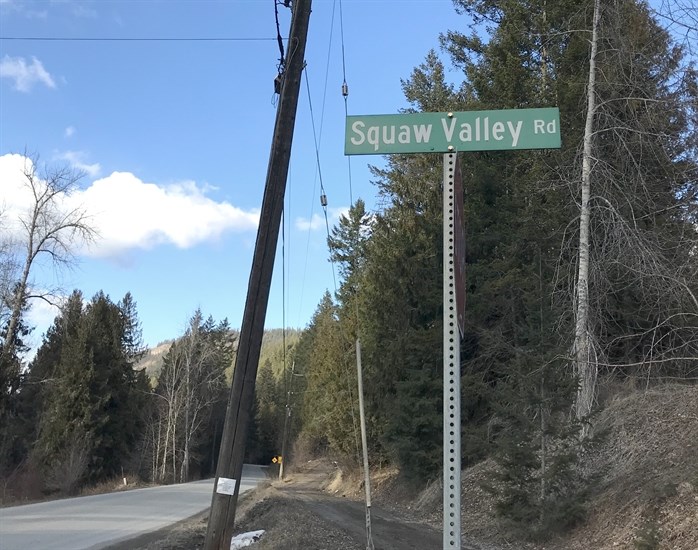
A Squaw Valley Road sign is pictured in this undated photo. The rural road in the North Okanagan is getting a name change.
Image Credit: SUBMITTED/Brittney Brewer
March 11, 2021 - 6:00 PM
A quiet rural Lumby road with a racist and sexist name is set to get a name change.
The province has confirmed it's in the process of changing the name of Squaw Valley Road, due to its derogatory meaning.
The Ministry of Transportation and Infrastructure wouldn't confirm who put forward the request to change the name of the road, only that "concerns were brought forward" and it took the matter "very seriously."
North Okanagan Regional District Area D director Rick Fairbairn said he wasn't aware of how the potential name change had come about, but he'd been contacted by the Ministry regarding the matter.
"I'm not opposed to changing the name," Fairbairn said, adding none of his constituents had contacted him about changing the name.
Fairbairn said one suggestion was to change the name to Irish Creek Road. The name refers to a nearby creek that runs through the valley.
However, the Ministry wouldn't confirm any potential new names.
The long rural road runs through the Silver Hills area, north of Lumby, branching off Lumby-Mabel Lake Road. The road has been called Squaw Valley Road for as long as anyone can remember.
Located on Squaw Valley Road, Eileen Brewer has owned and run the Silver Hills Guesthouse for the last 35 years and says she supports the name change.
Brewer said while many of her guests don't comment about the road's name, some guests do and "they're not happy with it."
The Ministry told iNFOnews.ca it was consulting with those who live on the road, the Splatsin First Nation, as well as the Regional District. The Ministry said they was no timeline for when the name will be changed.
Splatsin First Nation was not immediately available for comment.
While the rural road doesn't contain many businesses it is home to the Squaw Valley Ranch. The owners of the cattle ranch were not immediately available for comment.
According to the 2001 edition of the Oxford Dictionary of Currently English, the word squaw is an offensive term for an Indigenous woman or wife. But while the dictionary decided at least 20 years ago that the term was offensive – and much of society long before then – squaw is still used in various places today.
In California, the host of the 1960 Winter Olympic Games, Squaw Valley Ski Resort, has said it will change its name after the 2021 ski season is over.
In a statement posted to its website, the ski resorts says when the resort took the name in 1949 there was "no intent whatsoever to be derogatory or offensive." The resort says the now the name is "undeniable" considered a racist and sexist slur.
The resort says dozens of places in the U.S. have removed the word squaw and in 1995 the state of Minnesota was the first of what is now six states to make it illegal to have a squaw in a place name.
Closer to home, in 2020 Parks Canada changed the name of the Stoney Squaw Summit trail in Banff National Park.
In September 2020, a mountain near Canmore called Squaw's Tit had its name changed to Anû kathâ Îpa, which in English means bald eagle peak, according to a Global News article.
Another mountain south of Canmore officially adopted the name Chinaman's Peak in 1980, more than eight decades after locals had started using the name in honour of a local chef who climbed the peak. In 1997 the name was changed to Ha Ling Peak.
In 2015, a petition to the Quebec government led to the province removing the N-word from 11 place names from all official maps of Quebec.
However, five years later only one of the places has been renamed, so private maps, including Google Maps, can still use the old names. N-word Rapids, 120 kilometres north of Ottawa, does however appear to have been removed from Google Maps.
The Saskatchewan town of Tisdale made international headlines in 2016 when it dropped its 60-year-old slogan, 'Land of Rape of Honey.' It changed its slogan to 'Opportunity Grows Here.'
To contact a reporter for this story, email Ben Bulmer or call (250) 309-5230 or email the editor. You can also submit photos, videos or news tips to the newsroom and be entered to win a monthly prize draw.
We welcome your comments and opinions on our stories but play nice. We won't censor or delete comments unless they contain off-topic statements or links, unnecessary vulgarity, false facts, spam or obviously fake profiles. If you have any concerns about what you see in comments, email the editor in the link above.
News from © iNFOnews, 2021